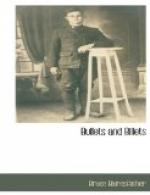This monotonous dreary routine of “in” and “out” of the trenches had to be gone through many, many times before we got to Christmas Day. But, during that pre-Christmas period, there was one outstanding feature above the normal dangerous dreariness of the trenches: that was a slight affair in the nature of our attack on the 18th of December, so in the next chapter I will proceed to outline my part in this passage of arms.
CHAPTER VII
A PROJECTED ATTACK—–DIGGING A SAP—
AN ’ELL OF A NIGHT—THE ATTACK—
PUNCTURING PRUSSIANS
[Illustration: O]
One evening I was sitting, coiled up in the slime at the bottom of my dug-out, toying with the mud enveloping my boots, when a head appeared at a gap in my mackintosh doorway and said, “The Colonel wants to see you, sir.” So I clambered out and went across the field, down a trench, across a road and down a trench again to where the headquarter dug-outs lay all in a row.
I came to the Colonel’s dug-out, where, by the light of a candle-end stuck on an improvised table, he was sitting, busily explaining something by the aid of a map to a group of our officers. I waited till he had finished, knowing that he would want to see me after the others, as the machine-gunner’s job is always rather a specialized side-line. Soon he explained to me what he wished me to do with my guns, and gave me a rough outline of the projected attack. He pointed out on the map where he wished me to take up positions, and closed the interview by saying that he thought I should at once proceed to reconnoitre the proposed sites, and lay all my plans for getting into position, as we were going to conduct an operation on the Boches at dawn the next day.
I left, and started at once on my plans. The first thing was to have a thorough good look at the ground, and examine all the possibilities for effective machine-gun co-operation. I determined to take my sergeant along with me, so that he would be as familiar with the scheme in hand as I was. It was raining, of course, and the night was as black as pitch when we both started out on our Sherlock Holmes excursion. I explained the idea of the attack to him, and the part we had to play. The troops on our right were going to carry out the actual attack, and we, on their left flank, were going to lend assistance by engaging the Deutschers in front and by firing half-right to cover our men’s advance. My job was clear enough. I had to bring as many machine guns as I could spare down to the right of our own line to assist as much as possible in the real attack. My sergeant and I went down to examine the ground where it was essential for us to fix up. We got to our last trench on the right, and clambering over the parapet, did what we could to find out the nature of the ground in front, and see how we could best fix our machine guns to cover the enemy. We soon saw that in order to get a really clear field of fire it was necessary for us to sap out from the end of our existing right-hand trench and make a machine-gun emplacement at the end.




